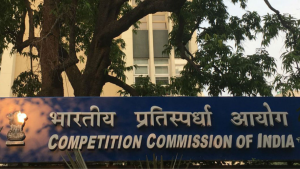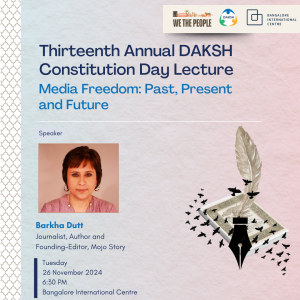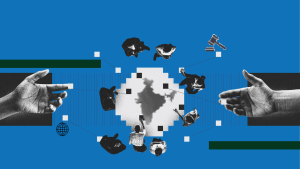

Election Commission
- Leah Verghese
- /
- The DAKSH Podcast /
- Election Commission
References
About Election Commission of India https://www.eci.gov.in/about-
eci An Expert Explains: How EC evolved, what rules it follows in case of disagreement https://indianexpress.com/
article/explained/an-expert- explains-how-election- commission-evolved-what-rules- it-follows-in-case-of- disagreement-5720029/ Anoop Baranwal vs. Union of India WP (CIVIL) NO.104 OF 2015
Appointment of CEC, EC | Supreme Court refuses to stay new law; issues notice for hearing in April https://www.thehindu.com/news/
national/appointment-of-cec- ec-supreme-court-refuses-to- stay-new-law-issues-notice- for-hearing-in-april/ article67733389.ece Manjari Katju, Election Commission and Changing Contours of Politics Economic and Political Weekly Vol. 44, No. 16 (Apr. 18 – 24, 2009)
Manjari Katju, Election Commission and Functioning of Democracy Economic and Political Weekly , Apr. 29 – May 5, 2006, Vol. 41, No. 17 (Apr. 29 – May 5, 2006)
R. P. Bhalla, Electoral Mechanism in India (1951-1971) The Indian Journal of Political Science Vol. 33, No. 1 (JAN-MAR, 1972)
S.S. Dhanoa vs. Union of India (1991) 3 SCC 567
The Chief Election Commissioner and Other Election Commissioners (Appointment, Conditions of Service and Term Of Office) Act, 2023
CREDITS:
Host: Leah Verghese
This is a Maed in India production.
Producer: Sean D’mello
Sound Mixing: Lakshman Parsuram
Project Supervisor: Shaun Fanthome
Research Assistance: Manushree Sarkar
Hello and welcome to the DAKSH Podcast. I’m your host, Leah.
India’s general elections have just begun, the results of which will determine the political direction of the world’s most populated nation for the next five years.
As I began watching the election coverage, I kept thinking back to the 2020 US race between Joe Biden and Donald Trump.
One thing that stood out to me was the lack of a central, independent body like the Election Commission in the US to run and manage any disputes that arose out of the elections.
Running an election in India is a massive logistical exercise. Poetic souls describe it as the dance of democracy.
Let’s break down the numbers for the 2024 Lok Sabha elections just to give you a sense of the scale. There are 96 crore registered voters across.
12 lakh polling stations in 543 constituencies. 1.5 crore election officials will oversee these elections. This humongous task is managed mostly by the Election Commission of India.
So how did they do it? Well, we thought this would be a good time to take a look at the history, structure and responsibilities of India’s Election Commission.
The Election Commission, or the EC, is a permanent constitutional authority. That is, an independent arm of the executive branch of the government. They are responsible for conducting parliamentary and state elections.
They ensure that every election is free, fair, without undue influence, and most importantly that every Indian citizen gets a chance to cast their vote without fear or consequences.
They perform crucial functions like preparing election schedules, figuring out the location of polling stations, registration of voters,
assigning the location of counting centres and enforcing campaign expenditure laws. It is headed by the Chief Election Commissioner along with two other commissioners, all of whom are appointed by the President.
Now here’s an interesting fact. Until 1989, the election commission was a single-member body consisting solely of the Chief Election Commissioner.
Talk about being your own boss, or should I say being your own chief! Eventually, the Rajiv Gandhi government created two elections.
additional positions in 1989. SS Dhanoa and VS Sehgal were appointed as election commissioners
under the chairmanship of the chief RVS Peri Shastri. The three-member arrangement lasted only 70 days. This was due to differences between the Congress government and the chief election
commissioner. Yet, even this impasse didn’t last long because SS Dhanoa challenged his dismissal
before the Supreme Court. In the case of SS Dhanoa versus Union of India, the court observed that more heads were better than one when you’re responsible for important constitutional functions.
This led to the expansion of the commission and that’s why today it has three members.
The election commission has seen through a lot of chaos and drama in the early 1990s. I mean, trying to be straight and narrow in politics is never easy.
The country was in the middle of an economic crisis and recovering from the political assassination of former Prime Minister Rajiv Gandhi. The ruling Congress government was plagued with
corruption charges during this era of briefcase politics. This period also saw the appointment
of two unique chief election commissioners or CECs. The first was VS Ramadevi, who holds the
twin distinction of being the only woman till date to hold this post and the CEC with a short-term position. The other was VS Ramadevi, who holds the twin distinction of being the only woman till date to hold this post and the CEC with a short-term position. The other was VS Ramadevi, who holds the twin distinction of being the only woman till date to hold this post and the CEC with a short-term position. Her successor T.N. Session was CEC for six years
and would go on to have the third longest tenure as chief election commissioner. To appreciate the length of his service, the last five CECs together haven’t occupied this
office for as long as T.N. Session did. Session was an imposing figure who exuded
an aura of strength and determination. It was during his term that regular citizens became aware of the power of the EC. He was known for his tough stance and firm implementation of electoral reforms.
Early in his tenure, Seishan identified over 100 common electoral malpractices. He revolutionized the way we ran elections by introducing photo-elector ID cards,
commonly known as voter IDs, and also firmly enforcing campaign expenditure laws. The introduction of voter ID cards in particular drew ire and protests from various politicians at the time.
It is important to remember that prior to Aadhaar, voter IDs were the primary document to establish citizenship and proof of address.
T.N. Seishan’s no-nonsense approach and deep commitment to upholding the principles of democracy as well as a free and fair election are exemplified by the events leading up to the 11th Lok Sabha elections in 1996.
This would end up being T.N.’s first election in 1996. T.N. Seishan’s last general election as chief election commissioner. Indian elections during this period lived in the shadow of accusations of booth capturing and fake ballots.
Alongside voter IDs, Seishan also wanted to introduce electronic voting machines or EVMs. Till the mid-90s, all votes cast in India were through paper ballots and counted manually.
This left large scope for human error and booth capturing. For our younger listeners, let me explain booth capturing. It typically involves a group of individuals,
often affiliated with a political party, forcibly taking control of a polling station during an election. They would then cast fraudulent votes or coerce voters to support their preferred candidate.
Frustrated by the inaction of the P.V. Narasimha Rao government to enable electoral reforms, in October 1994, Seishan announced that if the government did not mandate and issue voter ID cards
to every eligible citizen, no elections would be held after January 1st, 1995. No cards, no polls.
This delayed a number of key elections during that period and even threatened the Lok Sabha elections, which was a little over a year away. The Supreme Court had to step in to resolve the impasse.
They ruled that since voting was an inherent right of citizens, it could not be postponed indefinitely because voters lacked ID cards. Seishan, however, would not be slowed down.
He also instituted the practice of using election observers and implemented Section 77 of the Representation of People Act 1951,
which made it obligatory for candidates to keep an accurate account of their campaign expenditure. This included a ceiling on how much they could spend.
He was truly an independent CEC, just as the framers of our constitution hoped for. Given the importance of a free and fair election,
the process of appointing the Chief Election Commissioner and the two other election commissioners is a pivotal cog in the election machine. So how do we keep this office independent and free from political interference?
For decades, the President appointed this three-member body on the advice of the Prime Minister. This meant that the appointees would usually be people who were well inclined towards the ruling party.
In 2015, Anoop Bharanwal approached the Supreme Court with the whole view that the election would be a good idea. He said,
The main question before the court was whether the method of appointing the members of the election commission was unconstitutional and if it violated the right to free and fair elections.
The petition claimed that, according to Article 324 of the Constitution, Parliament was obligated to draft a law to appoint members to the election commission.
Eight years later, on 2 March 2023, a five-judge bench of the Supreme Court held that, since the Parliament had failed to pass any laws regarding the appointment of the EC,
the court had no choice but to establish an interim process to appoint the members. The court held that a committee of the Prime Minister,
the Leader of the Opposition and the Chief Justice of India would advise the President on appointments.
The bench in its judgement highlighted that the election commission should be independent, fair and follow the rule of law and the principle of equality. The court viewed that,
as long as the executive, i.e. the Prime Minister and the Cabinet, decided election commission appointments on their own, independence was compromised.
It is important here to mention that no election commissioner was ever appointed by such a committee.
However, the Supreme Court did leave space for Parliament to pass a law since the Constitution prescribed it. This is different from a scenario in which a law is struck down by a court for being unconstitutional,
in which case it would have been tougher for the government to pass it. You can listen to our episode on constitutionality to understand this better. It is linked in the show notes below. Here, there was no law.
Eager to seize this opportunity and fill a legislative void, the government quickly passed the Chief Election Commissioner and other election commissioners’ Appointment, Conditions of Service and Term of Office Act in 2023
in the backdrop of the suspension of 97 opposition members. Under this new law, the Chief Election Commissioner and the other two election commissioners
would be appointed by the President upon the recommendation of a selection committee. This selection committee consists of the Prime Minister, a Union Cabinet Minister, and the Leader of the Opposition in the Lok Sabha.
But since a majority of the committee is made up of members of the ruling party, it’s a far cry from the balance suggested by the Supreme Court. Less than a month later,
and on the first day the Supreme Court convened in the New Year, Mahila Congress Committee General Secretary, Dr. Jaya Thakur, moved the court seeking a stay on the newly enacted law.
Subsequently, other organizations like the Association for Democratic Reforms also filed petitions challenging the new law. These petitions claimed that the act
breaks the spirit of the constitution-bent judgment. They argued that the selection committee should be insulated from all political and executive interference.
Much rests on the shoulders of the incumbent Chief Election Commissioner, Rajiv Kumar, who will be overseeing his first Lok Sabha election, and his two deputies, Gyanesh Kumar and Sukhbir Singh Sandhu,
the first commissioners appointed under the new law. They were selected by a committee of the Prime Minister, Narendra Modi, Home Minister Amit Shah, and Leader of the Opposition, Adir Ranjan Chaudhary.
Chaudhary did file a dissent note, saying that the shortlisted names were shared with him only 10 minutes prior to the meeting. Gyanesh Kumar and Sukhbir Singh Sandhu
carry the burden of proving the skeptics of the new law wrong. Many challenges lie before these three gentlemen as they oversee the elections in the world’s largest and most colorful democracy.
If you would like to know more about our work, visit our website dakshindia.org
Don’t forget to tap, follow or subscribe to us wherever you listen to your podcasts so that you don’t miss an episode. We would love to hear from you, so do share your feedback either by dropping us a review
or rating the podcast where podcast apps allow you to. Talk about it on social media. We are using the hashtag Dakspodcast. It really helps to get the word out there.
Most of all, if you found some useful information that might help a friend or family member, share the episode with them. A shout out to Manushree Sarkar for her research assistance.
A special thank you to our production team at Made in India. Our production head, Sean DeMello. Edited, mixed and mastered by Lakshman Parashuram and project supervision by Sean Fantham.
RECENT UPDATE


Thirteenth Annual DAKSH Constitution Day Lecture

Not Quite Rocket Science

